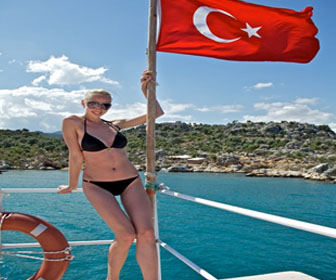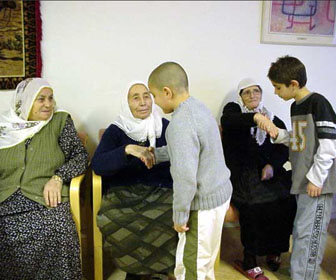 |
 |
| |
|
| |
TIPS ABOUT TURKEY FOR TRAVELLERS

|
| |
|
|
|
- Consult your local Turkish consulate for visa
purposes. Visa requirements vary depending on your country of
residence.
- Almost 90% of shops and restaurants accept major credit cards like
Visa or Mastercard. However be sure to carry a small amount of cash
with you. You can exchange your money to YTL at banks or at foreign
exchange offices. You can also convert your travellers' cheques at
banks.
- Public telephones have 3 different payment methods, tokens (jeton
in Turkish), phone cards and credit cards. Phone cards and tokens
can be bought from the PTT Offices.
|
|
| |
|
|
|
| |
 |
 |
|
| |
|
|
|
| |
-
When visiting a mosque, be sure to respect the traditions, dress
modestly and take off your shoes before entering.
-
The famous alholic drink of Turkey, raki, can be found almost
everywhere. Remember that raki has 45% alcohol and don't drink raki
as you drink beer.
- Antique pieces are not allowed out of Turkey, this is a crime.
- Smoking is not permitted in flights and all public places.
- Hospitality is a tradition of Turks, don't be surprised...
- If you are visiting Turkey in summer be sure to bring sunglasses,
hats, sun cremes, etc.
- Although tap water is safe to drink, prefer bottled water.
- Be aware of the traffic in Turkey, especially in big cities. Do
not cross the street before being sure of a safe pass. Traffic rules
are not strictly obeyed here, you will be surprised.
- Bargaining is part of the Turkish culture, a reduction of 10-20%
is always possible especially in local shops.
- Gift giving has no real place in business relationships or
etiquette. However, if a gift is given it will be accepted well. It
is always a good idea to bring gifts from your own country such as
food stuffs or craft items. Be aware that Turkey is a Muslim
country. Before giving alcohol to anyone be 100% sure that they
drink.
- Turkish guys enjoy food and the meal. Dinner might be good time
for relaxing and engaging in some good conversation. The protocol of
Turkish hospitality dictates that the host always pays for the meal.
The concept of sharing a bill is completely alien. You may try and
offer to pay, which may be seen as polite, but you would never be
allowed to do so.
- When addressing a Turk the most common method is to call a man by
his first name followed by 'bey' (pronounced bay). So, Recep Tayyip,
would be Recep Bey. Similarly a woman's first name would be followed
by 'hanim' (pronounced ha-num).
- A common phrase you will hear Turks using is 'efendim' (literally
'my master'). You may hear this from a waiter, a secretary, taxi
driver, doorman, shop staff and many others. It is simply a polite
way of addressing people you are not familiar with.
Meeting and Greeting Etiquette
- When meeting shake hands firmly. When departing it is not always
customary to shake hands although it is practised occasionally.
- Friends and relations would greet each other with two kisses on
the cheek. Elders are always respected by kissing their right hand
then placing the forehead onto the hand.
- When entering a room, if you are not automatically met by someone
greet the most elderly or most senior first.
- Greet people with either the Islamic greeting of 'Asalamu alaykum'
(peace be upon you) or 'Nasilsiniz' (How are you? pronounced
na-sul-su-nuz).
-
Other useful phrases are 'Gunaydin' (Good Morning, pronounced
goon-ay-dun), 'iyi gunler' (Good Days, pronounced ee-yee gun-ler) or
'Memnun Oldum' (pleased to meet you).
|
|
| |
|
|
|
| |
|
|
|
| |
|
|
|
|
|
|

|
|
| |
|
|
|
| |
|
|
|
<-Back
|
|
 |
|
